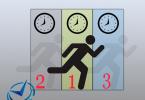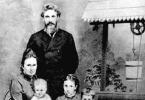The topic of the verb in German is very extensive: it includes tenses, participles, and voices. At first glance, it may seem that it is impossible to learn all this on your own, but do not rush to get upset: all grammatical topics are closely related to each other.
Let's look at the topic of tenses in German.
General information about tenses in German

To begin with, it is worth noting that the topic of tenses in German is much easier to understand than in English. Firstly, there is no continuous form of the verb Continuous, and, secondly, the rules of use are not so strict.
Temporal forms in German express the same as in Russian: present, past and future.
However, if there is one present tense, then there are three forms of the past, and two of the future. It’s strange, you might think, why do events in the past take three whole times?
To understand this, let's look at them in more detail.

In German it is called Präsens. You start learning a language with the present: you remember the place of the verb in a sentence and learn personal endings.
For example:
The simplest sentence in Präsens would look like this:
Wir lesen ein Buch. - We are reading a book.
This tense should be used when an event or action:
- happening right now;
- occurs regularly or recurs;
- still not completed, i.e. began in the past and continues;
- will happen in the near future;
- when it comes to schedules or schedules.

There are three of them in the German language. But don’t be alarmed, it’s very difficult to get confused in them.
Past tense (Präteritum)
Except Perfect (perfect tense) There is also a simple past tense in the German language - Präteritum(which in Latin means past past). It is formed using the suffix -t-. Compare:
Ich tanze. – I am dancing (present tense – Präsens).
Ich tanz t e. – I danced (past tense – Präteritum).
This is similar to the English past tense, where the sign of the past tense is the suffix -d-:
I dance – I danced.
Präsens Präteritum
ich sage - I say ich sagte - I said
wir, sie, Sie sagen wir, sie, Sie sagten
du sagst du sagtest
er sagt er sagte (!)
ihr sagt ihr sagtet
Feature Präteritum is what is in the form he she it) no personal ending added -t, that is: forms I And He match up. (As you remember, the same thing happens with modal verbs.)
As we have already said, the German language has strong (irregular, non-rule) verbs. Sagen – weak, regular verb. And here fallen – strong:
ich, er fiel (I, he fell), wir, sie, Sie fielen,
du fielst,
ihr fielt.
The past tense suffix is no longer needed here -t-, since the past tense is indicated by the changed word itself (compare with English: I see - I see, I saw - I saw). Forms I And He are the same, there are no personal endings in these forms (all the same as with modal verbs in the present tense).
So, the Russian phrase I bought beer It can be translated into German in two ways:
Ich kaufte Bier. – Präteritum (past tense).
Ich habe Bier gekauft. – Perfect (perfect tense).
What is the difference?
Perfect is used when an action performed in the past is connected with the present moment, when it is relevant. For example, you come home and your wife asks you (as they say, dreaming is not harmful):
Hast du Bier gekauft? – Did you buy beer?
Ja, ich habe Bier gekauft.(You answer with a sense of accomplishment).
She is not interested in the moment in the past when you bought beer, not in history, but in the result of the action - that is, the availability of beer. Is it done or not? Has it happened or not? Hence the name - Perfect (perfect tense).
Präteritum (past tense) used when an action performed in the past has nothing to do with the present moment. It's just a story, a story about some past events. That's why Perfect is used, as a rule, in conversation, in dialogue, when exchanging remarks (after all, it is in conversation that what is most often important is not the action itself in the past, but its relevance for the present, its result), and Präteritum- in a story, in a monologue. For example, you talk about how you spent your vacation:
Ich kaufte ein paar Flaschen Bier... Dann ging ich an den Strand... – I bought a few bottles of beer, went to the beach...
Or tell your child a fairy tale:
Es war einmal ein König, der hatte drei Töchter... - Once upon a time there was a king, he had three daughters...
Ich kam, ich sah, ich siegte. – I came, I saw, I conquered.
Because the Präteritum needed, as a rule, for a story, then the second person form ( you you) are rarely used. Even in a question to a person telling about something, it is more often used Perfect – so used to it that this form is for replicas, Präteritum with this interruption of the narrator it sounds very literary (albeit beautiful): Kauftest du Bier? Gingt ihr dann an den Strand? Basically, you will encounter and use the following two forms:
(ich, er) kaufte, wir (sie) kauften– for weak verbs,
(ich, er) ging, wir (sie) gingen– for strong verbs.
Table - formation of the preterite:
So: in conversation you use Perfect, in a story (about events not related to the present moment) - Präteritum.
However Präteritum verbs sein, haben and modal verbs (+ verb wissen) is also used in conversation - along with Perfect:
Ich war in der Türkei. (Präteritum) – I was in Turkey.
= Ich bin in der Türkei gewesen. (Perfect)
Ich hatte einen Hund. (Präteritum) – I had a dog.
= Ich habe einen Hund gehabt. (Perfect)
Ich musste ihr helfen. (Präteritum) – I had to help her.
= Ich habe ihr helfen müssen. (Perfect)
Ich wusste das. (Präteritum) - I knew it.
Ich habe das gewusst. (Perfect)
Past tense forms sein -> war (du warst, er war, wir waren…) And haben -> hatte (du hattest, er hatte, wir hatten…) need to remember.
Modal verbs form Präteritum as weak - by inserting a suffix -t-, with the only peculiarity that Umlaut (mutation) in this case it “evaporates”: müssen -> musste, sollen -> sollte, dürfen -> durfte, können -> konnte, wollen -> wollte.
For example:
Ich konnte in die Schweiz fahren. Ich hatte Glück. Ich war noch nie in der Schweiz. – I was able to go to Switzerland. I was lucky (I was lucky). I've never been to Switzerland before.
Separately, you need to remember: mögen -> mochte:
Ich mochte früher Käse. Jetzt mag ich keinen Käse. – I used to love cheese. Now I don't like cheese.
Now we can write down the so-called basic forms of the verb (Grundformen):
Infinitiv Präteritum Partizip 2
kaufen kaufte gekauft
(buy) (bought) (purchased)
trinken trunk getrunken
For weak verbs, there is no need to memorize the basic forms, since they are formed regularly. The basic forms of strong verbs must be memorized (as, by the way, in English: drink – drank – drunk, see – saw – seen…)
For some strong verbs, as you remember, you need to remember the present tense form (Präsens) – for forms You And he she it): nehmen – er nimmt (he takes), fallen – er fällt (he falls).
Of particular note is a small group of verbs intermediate between weak and strong:
denken – dachte – gedacht (to think),
bringen – brachte – gebracht (bring),
kennen – kannte – gekannt (to know, to be familiar),
nennen – nannte – genannt (to name),
rennen – rannte – gerannt (run, rush),
senden – sandte – gesandt (to send),
(sich) wenden – wandte – gewandt (to address).
They get in Präteritum and in Partizip 2 suffix -t, like weak verbs, but at the same time they change the root, like many strong ones.
For senden And wenden weak forms are also possible (although strong (with -A-) are used more often:
Wir sandten/sendeten Ihnen vor vier Wochen unsere Angebotsliste. – We sent you a list of proposals four weeks ago.
Sie wandte/wendete kein Auge von ihm. – She didn’t take her eyes off him (didn’t turn away).
Haben Sie sich an die zuständige Stelle gewandt/gewendet? – Have you contacted the appropriate (responsible) authority?
If senden has the meaning broadcast, A wenden – change direction, turn over, then only weak forms are possible:
Wir sendeten Nachrichten. - We conveyed the news.
Er wendete den Wagen (wendete das Schnitzel). - He turned the car (turned the schnitzel over).
Jetzt hat sich das Blatt gewendet. – Now the page has turned (i.e. new times have come).
There are several cases where the same verb can be both weak and strong. At the same time, its meaning changes. For example, hängen in meaning hang has weak forms, and in the meaning hang - strong (and in general, in such “double” verbs, the active “double”, as a rule, has weak forms, and the passive one has strong forms):
Sie hängte das neue Bild an die Wand. – She hung a new picture on the wall.
Das Bild hing schief an der Wand. – The picture hung crookedly on the wall.
Hast du die Wäsche aufgehängt? -Have you hung up your laundry?
Der Anzug hat lange im Schrank gehangen. – This suit hung in the closet for a long time.
Verb erschrecken – weak if it means frighten, and strong if it means get scared:
Er erschreckte sie mit einer Spielzeugpistole. “He scared her with a toy gun.”
Sein Aussehen hat mich erschreckt. – His (appearance) frightened me.
Erschrecke nicht! - Do not scare!
Sie erschrak bei seinem Anblick. – She was scared when she saw him (literally: when she saw him).
Ich bin über sein Aussehen erschrocken. – I’m scared by his appearance (the way he looks).
Erschrick nicht! - Do not be afraid!
Verb bewegen could mean like move, set in motion(and then he is weak), so encourage(strong):
Sie bewegte sich im Schlaf. – She moved (i.e., tossed and turned) in her sleep.
Die Geschichte hat mich sehr bewegt. – This story touched me very much.
Sie bewog ihn zum Nachgeben. – She prompted, forced him to yield (prompted him to yield).
Die Ereignisse der letzten Wochen haben ihn bewogen, die Stadt zu verlassen. “The events of recent weeks have prompted him to leave the city.
Verb schaffen - weak in meaning to work hard, to cope with something(by the way, the motto of the Swabians, and indeed the Germans in general: schaffen, sparen, Häusle bauen - to work, save, build a house) and strong in meaning create, create:
Er schaffte die Abschlussprüfung spielend. – He passed the final exam effortlessly.
Wir haben das geschafft! – We achieved it, we did it!
Am Anfang schuf Gott Himmel und Erde. – In the beginning, God created the heavens and the earth.
Die Maßnahmen haben kaum neue Arbeitsplätze geschaffen. – These events did not create new jobs.
Präteritum is a simple form of the past tense and is used in coherent descriptions, narratives, and in stories about the past. Therefore, it is usually called the past narrative tense. In modern German, it can express both completed and incomplete actions, both single and multiple. Translated into Russian using the past tense.
Präteritum weak verbs in German it is formed from the 2nd main form by adding the same personal endings as in Präsens. The exception is the 1st and 3rd person singular: in the 1st and 3rd person singular Präteritum the verb does not take a personal ending.
Face | Singular | Plural |
1st | Te+n |
|
2nd | Te + st | Te+t |
3rd | Te+n |
The weak verb m achen has the following forms - machte- gemacht. We take the second form as a basis machte and add the following endings:
Ich machte
Du machte st
Er, sie, es machte
Wir machte n
Ihr machte t
Sie, sie machte n
For Präteritum strong verbs The German language is characterized by a change in the root vowel. Strong verbs, like weak ones, take the same personal endings as in Präsens. In the 1st and 3rd person singular they also do not have personal endings.
Face | Singular | Plural |
1st | — | |
2nd | — st | |
3rd | — |
Strong verb (for example, sprechen - sprach- gesprochen) will have exactly the same endings as the weak verb, with the exception of the vowel - e, which will appear with the forms wir and sie (Sie) (they, you)
Ich sprach
Du sprach st
Er,sie,es sprach
Wir sprach en
Ihr sprach t
Sie sprach en
Strong verbs whose root ends in ß, z, tz, sch, have in the 2nd person singular a connecting vowel between the root and the personal ending e:du lasest. In colloquial speech the form du last is used.
Präteritum of verbs haben, sein, werden, tun has its own characteristics (these forms must be remembered).
Face | Auxiliary verbs |
|||
werden | sein | haben | tun |
|
ich | wurde- | war- | hatte- | tat- |
du | wurde-st | war-st | hatte-st | tat-st |
er | wurde- | war- | hatte- | tat - |
wir | wurde-n | war-en | hatte-n | tat-en |
ihr | wurde-t | war-t | hatte-t | tat-et |
sie | wurde-n | war-en | hatte-n | tat-en |
Modal verbs and verb wissen in German they form the preterite according to the type of weak verbs, i.e. by adding the suffix -te. Modal verbs können, dürfen, müssen, mögen in the present they lose their umlaut. The verb wissen takes the suffix into the preterite -te and changes the root vowel.
Face | können | wissen |
ich | konnte- | wusste- |
du | konnte-st | wusste-st |
er | konnte- | wusste- |
wir | konnte-n | wusste-n |
ihr | konnte-t | wusste-t |
sie | konnte-n | wusste-n |
To improve your German or prepare for exams, we recommend classes with online tutors at home! All the benefits are obvious! Trial lesson for free!
We wish you success!
If you liked it, share it with your friends:
The German (German) language has three forms of the past tense: Perfekt, Präteritum and Plusquamperfekt. All three mentioned temporary forms are German. verbs (verbs) serve to convey actions in the past tense and do not demonstrate any fundamental differences from each other in terms of conveying events.
Präteritum is a simple past tense, used primarily in various literary works and in situations where the speaker is telling something about past events. Modal verbs, verb. sein and haben are used in it. language, as a rule, precisely at this time.
By its name, Präteritum coincides with the second of the three main forms of German. verbs. The difference between them is the fact that when setting verbs. in this tense form in speech, a personal ending = conjugation is added to the base Präteritum (with the exception of the third and first person singular, in which personal endings are simply absent).
Präteritum: German verbs in the past tense
| Face | Strong verbs | Weak verbs | Auxiliary verbs. | Modal verbs. | ||
| to lie down | yawn - yawn | to be done - to be done | to be - sein | have - haben | be able to, be able - können | |
| ich | l ag- | gähnte- | wurde- | war- | hatte- | konnte- |
| du | lag-st | gähnte-st | wurde-st | war-st | hatte-st | konnte-st |
| er | lag- | gähnte- | wurde- | war- | hatte- | konnte- |
| wir | lag-en | gähnte-n | wurde-n | war-en | hatte-n | konnte-n |
| ihr | lag-t | gähnte-t | wurde-t | war-t | hatte-t | konnte-t |
| sie | lag-en | gähnte-n | wurde-n | war-en | hatte-n | konnte-n |
Perfect is a complex past tense, used primarily in dialogic conversational speech. Perfect conveys a past action associated with the present or precedes some action in the present, expressed in the same sentence by another verb. in Präsens. To form Perfectt, one of the auxiliary verbs is taken. (sein or haben) in the personal form Präsens and the past participle Partizip II (the third of the main forms), formed from the semantic verb. Verb. sein for the formation of Perfect is chosen when the semantic verb. denotes movement, a rapid change in some state. In addition, there are several more verbs that form complex past tenses with sein, which simply need to be remembered: succeed - succeed - gelingen, become - werden, meet - begegnen, remain - bleiben, be - sein, happen - passieren, happen - geschehen. Verb. haben for the formation of Perfect is chosen in cases where the semantic verb. is transitive, modal, reflexive or intransitive, which however is not related to movement, movement or change of state, or conveys a state of a lasting nature (for example, sleep - schlafen).
Perfect: German verbs in the past tense
| Face | ||
| ich | habe seine Gäste überrascht | bin langsam gelaufen |
| du | hast seine Gäste überrascht | best langsam gelaufen |
| er | hat seine Gäste überrascht | ist langsam gelaufen |
| wir | sind langsam gelaufen | |
| ihr | habt seine Gäste überrascht | seid langsam gelaufen |
| sie | haben seine Gäste überrascht | sind langsam gelaufen |
Plusquamperfekt is also a compound past tense, which is used in speech in cases where it is necessary to emphasize the precedence of one action to another in the past. The action following the expressed Plusquamperfekt is expressed in such situations by another verb. in Präteritum. Choice of auxiliary verbs. carried out exactly according to the same scheme as for Perfect.
Plusquamperfekt: German verbs in the past tense
| Face | seine Gäste überraschen – to surprise his guests | langsam laufen – to run slowly |
| ich | hatte seine Gäste überrascht | war langsam gelaufen |
| du | hattest seine Gäste überrascht | warst langsam gelaufen |
| er | hatte seine Gäste überrascht | war langsam gelaufen |
| wir | hatten seine Gäste überrascht | waren langsam gelaufen |
| ihr | hattet seine Gäste überrascht | wart langsam gelaufen |
| sie | hatten seine Gäste überrascht | waren langsam gelaufen |
Examples of using German past tenses in speech:
- Den ganzen Sommer verbrachte Irma in ihrem kleinen Landhaus, genoss frische Luft und Einsamkeit. – Irma spent the whole summer in her small country house, enjoying the fresh air and solitude (narrative Präteritum).
- Hat dir Irma verraten, wo sie diesen Sommer verbracht hat? – Did Irma reveal to you the secret of where she spent this summer (dialogical Perfekt)?
- Wir sind jetzt bei Irma, die uns in ihr gemütliches kleines Landhaus eingeladen hat . – We are now with Irma, who invited us to her cozy little country house (the second act in Perfekt precedes the first in Präsens).
- Als wir Irma be suchen wollten , entdeckten wir, dass sie vor ein paar Monaten ihre Wohnung verlassen hatte . – When we wanted to visit Irma, we discovered that she had left her apartment several months ago (the last action in Plusquamperfekt precedes the first two in Präteritum).
Präteritum used in a coherent narrative or description to express a completed, past action.
The peculiarity of all verbs in the form Präteritum is
1. lack of personal endings in 1st and 3rd lines. units h.
2. separable prefixes are separated and moved to the last place in the sentence.
Formation of the Präteritum form weak verbs:
Verb stem + suff. -(e)te + personal ending (except for 1st and 3rd units)
|
malen (mal-) |
arbeiten (arbeit-) |
||||||
| ich | mal te | wir | mal te n | ich | arbeit ete | wir | arbeit ete n |
| du | mal te st | ihr | mal te t | du | arbeit ete st | ihr | arbeit ete t |
| er | sie | mal te n | er | sie | arbeit ete n | ||
| sie | mal te | sie | arbeit ete | ||||
| es | Sie | mal te n | es | Sie | arbeit ete n | ||
Strong verbs form the Präteritum form as follows:
Verb stem with modified root vowel + personal ending (except for 1st and 3rd units)
|
nehmen |
gehen |
||||||
| ich | n a hmm | wir | nahmen | ich | g i ng | wir | g i ngen |
| du | n a hmst | ihr | n a hmt | du | g i ngst | ihr | g i ngt |
| er | sie | n a hmen | er | sie | g i ngen | ||
| sie | n a hmm | sie | g i ng | ||||
| es | Sie | n a hmen | es | Sie | g i ngen | ||
When forming Präteritum, as well as Perfekt of strong verbs, you should know the three main forms of the verb Infinitiv – Präteritum – Partizip II, eg.
kommen-kam-gekommen
gehen – ging – gegangen
schreiben – schrieb – geschrieben
The first form is the one already known to you, that is, the initial form of the verb, the second is the form of the verb in Präteritum in 1 or 3 liters. units h., from which all personal forms should be derived. And the third form will be needed to form another past tense Perfect. All three forms should be learned by heart, and they always appear in the table at the end of the dictionary.
In addition to strong verbs, the three forms of which are not formed according to the rules, there are several verbs that, when forming Präteritum, combine the features of both strong (changing the root vowel) and weak verbs (adding a suffix -te). These verbs include:
bringen – brachte
verbringen – verbrachte
kennen – kannte
brennen – brannte
nennen – nannte
and modal verbs, losing umlaut:
können – konnte
müssen – musste
Wollen – Wollte
mögen – mochte
sollen – sollte
durfen – durfte
And you should, of course, remember the 3 main forms separately auxiliary verbs:
sein-war-gewesen
haben – hatte – gehabt
werden – wurde – geworden
Exercises / ÜBUNGEN
1. Conjugate the verbs in Präteritum:
- warten - stoppen - sich kümmern - holen - versorgen - schenken - richten - gratulieren -
2. Read the following text and fill in the gaps with the verbs in Präteritum. Write down and learn 3 forms of these verbs.
3. Describe yesterday for the Muller farming family using the preterite. Refer to the table at the beginning of the article. Start your story, for example, like this:
Gestern begann der Tag für die Familie Müller wie immer sehr früh. Der Vater und die Mutter
standen um 6 Uhr auf…
4. Describe your own yesterday. What did you like (dislike) about it, what did you do in your working (free) time? Write at least 15 sentences.




